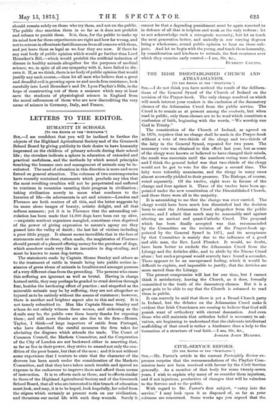THE IRISH DISESTABLISHED CHURCH AND ATHANASIANISM.
[To THE EDITOR OF THE " SPECTATOR:1
SIR,—I do not think you have noticed the result of the delibera- tions of the General Synod of the Church of Ireland on the revision of the Prayer-book. The only change resolved on which will much interest your readers is the exclusion of the damnatory clauses of the Athanasian Creed from the public service. The Creed is to remain as at present among the credenda, but when read in public, only those clauses are to be read which constitute a confession of faith, beginning with the words, "We worship one God in Trinity."
The constitution of the Church of Ireland, as agreed on in 1870, requires that no change shall be made in the Prayer-book without a vote of two-thirds of the clergy and two-thirds of the laity in the General Synod, repeated for two years. The necessary vote was obtained to this effect last year, but as some of the clergy were known or believed to have changed their minds, the result was uncertain until the numbers voting were declared, and I think the general belief was that two-thirds of the clergy would not be got to vote for the change a second time. The laity were tolerably unanimous, and the clergy in many cases almost avowedly yielded to their pressure. The Bishops, of course, voted separately. Of the twelve, eight were in favour of the change and four against it. Three of the twelve have been ap- pointed under the new constitution of the Disestablished Church, and these three were all in the majority.
It is astonishing to me that the change was ever carried. The clergy would have been much less dissatisfied had the decision been to omit the Athanasian Creed altogether from the public service, and I admit that much may be reasonably said against altering an ancient and quasi-Catholic Creed. The proposal which has been finally accepted was that recommended by the Committee on the revision of the Prayer-book ap- pointed by the General Synod in 1871, and its acceptance by that Committee is mainly due to the influence of a good and able man, the Rev. Lord Blanket. It would, no doubt, have been better to exclude the Athanasian Creed from the Liturgy and the Articles alike, and to abide by the Nicene Creed alone ; but such a proposal would scarcely have found a seconder. There appears to be an unexpressed feeling, which it would be difficult to explain, and impossible to justify, that the Articles are more sacred than the Liturgy.
The present compromise will last for our time, but I cannot think it satisfactory, leaving the Church, as it does, formally committed to the truth of the damnatory clauses. But it is a great gain to be able to say that the Church is ashamed to read them in public.
It can scarcely be said that there is yet a Broad-Church party in Ireland, but the debates on the Athanasian Creed make it evident that Irish Churchmen are ceasing to believe-that God will punish want of orthodoxy with eternal damnation. And even those who still maintain that orthodox belief is necessary to sal- vation, are beginning to understand that the elaborate intellectual scaffolding of that creed is rather a hindrance than a help to the formation of a structure of real faith.—I am, Sir, &c., JOSEPH JOHN MURPHY.


































 Previous page
Previous page